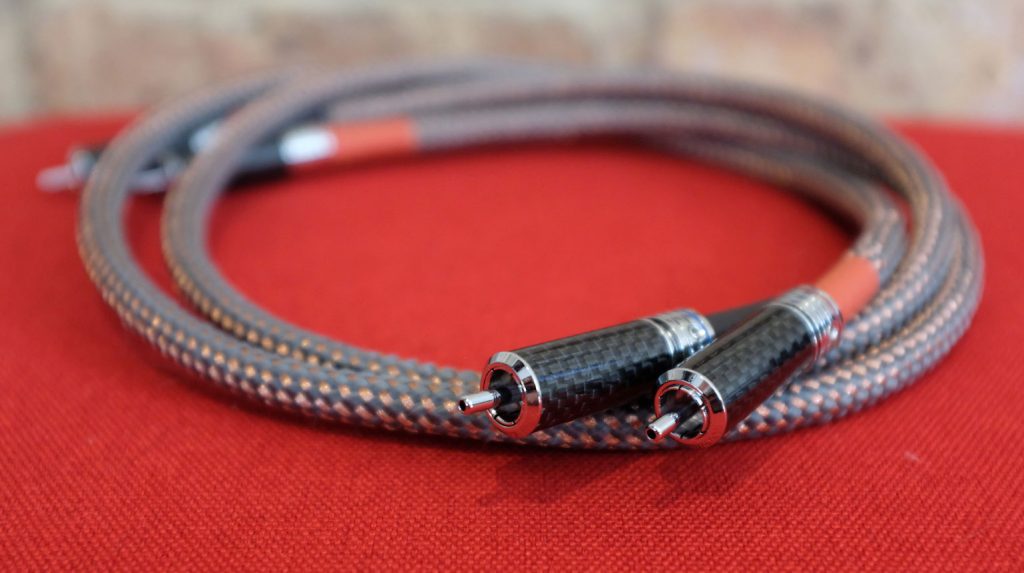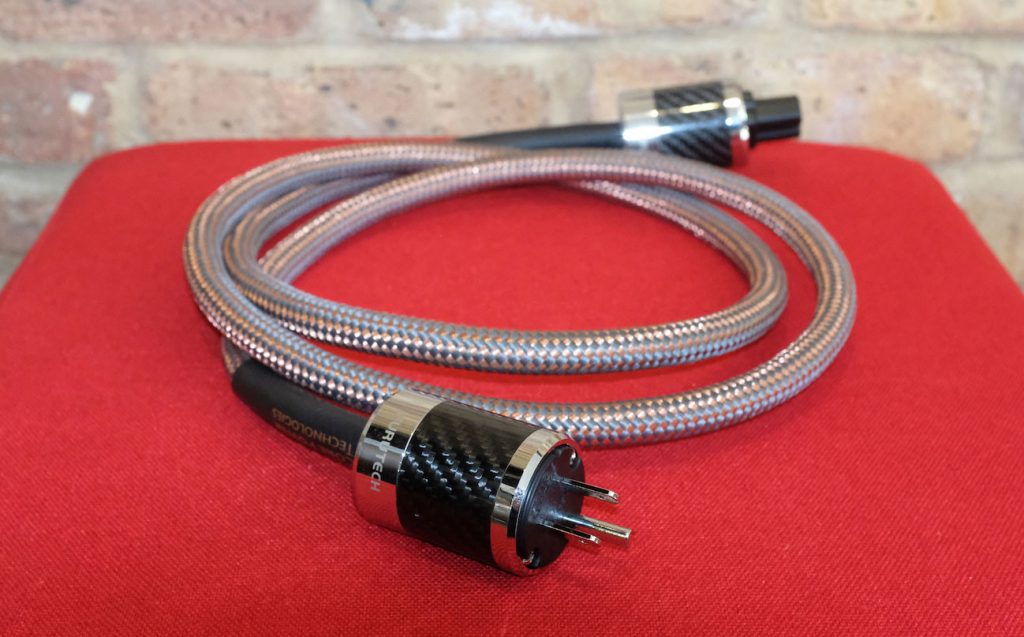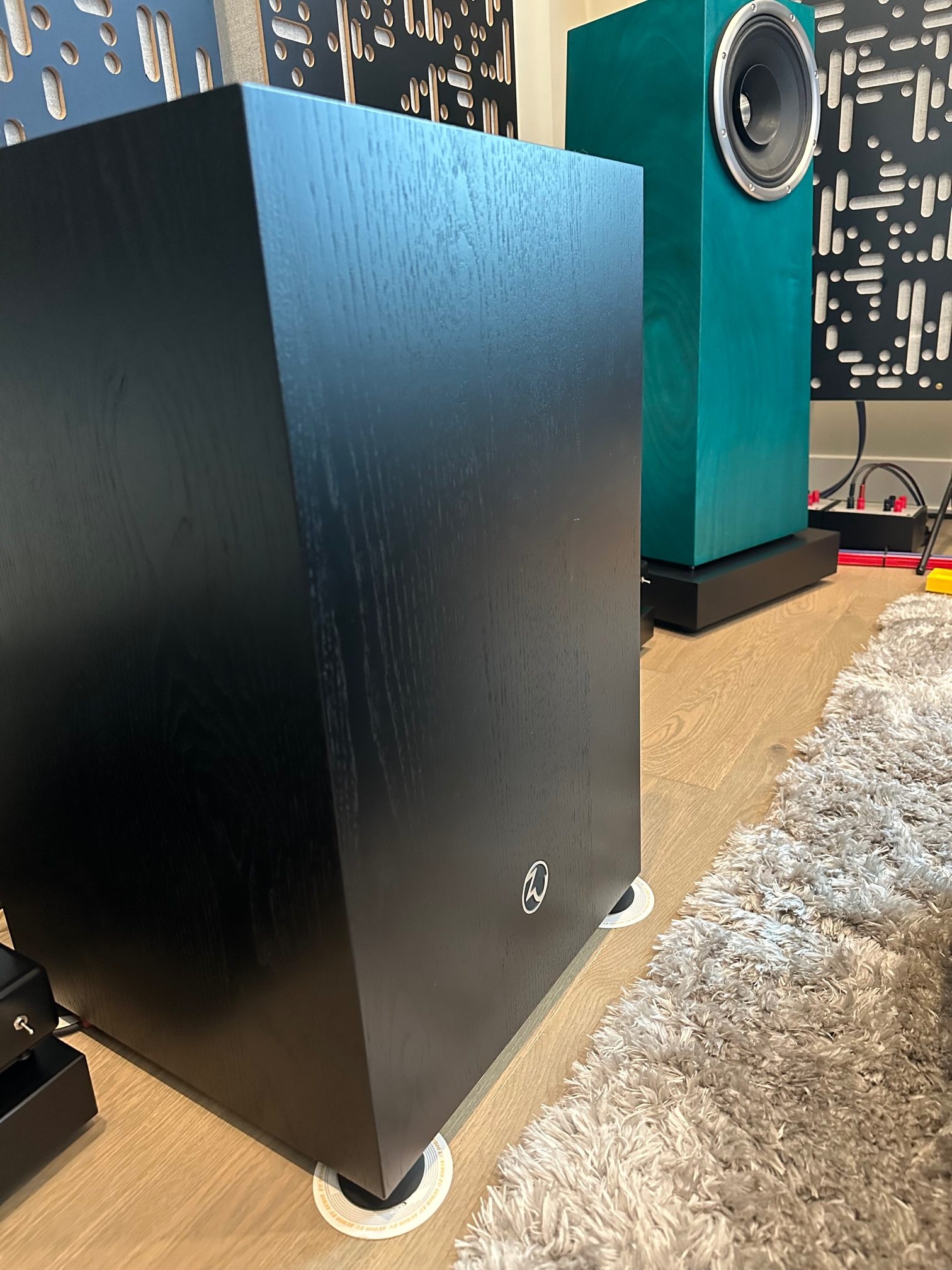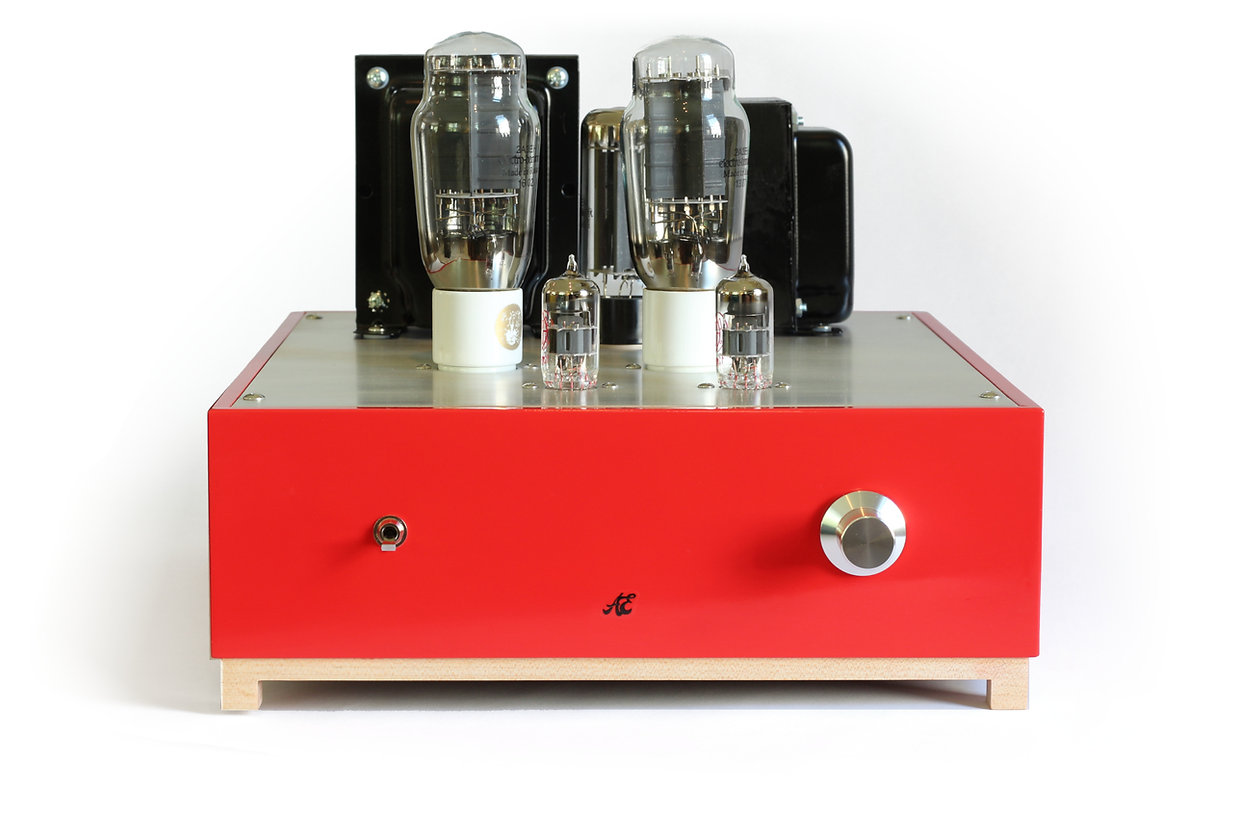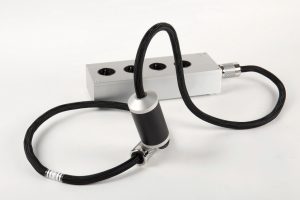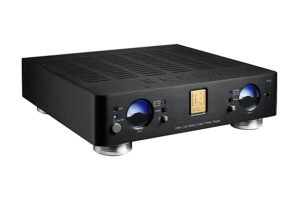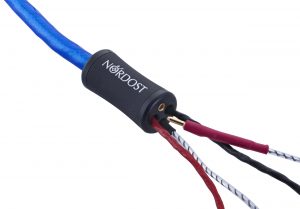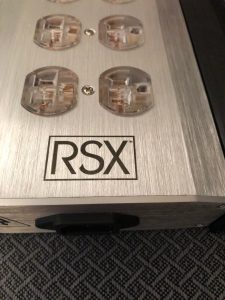Core Power Deep=Core 1800
Sometimes the job of an audio reviewer is hard. This is especially true for things like cables, power conditioners, and other components outside of source devices, preamplifiers, amplifiers, and speakers. Not only is there a fundamental debate in the audio world over whether or not these non-audio producing / processing devices make a difference, I but if they do, often times their differences are not easily measured or perceived. This tends to lead to more subjective reviews. I am very happy to say that for the most part Core Power's DEEP=CORE 1800 and Linx Diamond RCA cable, and Conduit Diamond Power Cable are not those types of devices.
Let's start with the DEEP=CORE 1800
Back of Deep=Core
Due to condo living, my main audio system is a high-end headphone system. My primary headphone is the Hifiman Susvara, an amazing yet incredibly inefficient headphone. I also own the Focal Utopia, Stellia, and I am currently reviewing the Hifiman HE1000SE. The latter three headphones are incredibly efficient. They are also much more susceptible to noise from upstream components and noisy power lines.
To combat noise in my system, I employ two balanced power conditioners, one for all digital equipment and one for my headphone amplifiers. My primary reference amplifier is the Ampsandsound Bigger Ben, which, on its own, is a very quiet tube amplifier. The Bigger Ben is tube rectified, and can either take a 5u4g rectifier tube or a 5AR4 rectifier tube. The 5AR4 approximately doubles the output power, but also approximately doubles the amps noise floor.
When using the Focal Stellia without the DEEP=CORE, the Bigger Ben with the 5u4g produces a slight hum. The hum is nearly inaudible, and is unnoticeable with music playing. However, when the 5AR4 is used, the noise floor increases substantially, making the amp unusable with those headphones.
In comes the DEEP=CORE. The DEEP=CORE is designed to sit in front of your existing power conditioners. It is a full 15 amp device, which means it has plenty of headroom to handle an entire system. It has two plugs on the back, and a standard IEC socket. Core Power was nice enough to send along their Diamond power cord as well (more on that later). With my power conditioners plugged into the DEEP=CORE I turned on the Bigger Ben and listened for a change in the noise floor.
The reason this review is easy, is because the DEEP=CORE works. Starting with the 5u4g rectifier tube, the faint hum was gone. It was replaced by an inky black background. Simple, easily, measurable, and effective. I assumed that replacing the 5u4g with the 5AR4 would likely reduce hum. Instead to my surprise I was greeted once again with an inky back background. No hum, no hiss, just silence. Of course listening to music sounded great, and I felt like bass was cleaner. To have no audible noise from an 8 watt single ended tube amp with 0 feedback using a 104dB efficient headphone is simply unreal and justifies the DEEP=COREs purchase for me.
So why does the DEEP=CORE work? The DEEP=CORE is essentially a series of filters that pre-condition your power before it even makes it to your existing power conditioners. It employs three discrete filters, starting with a DC Snubber, RF filter, and finally a EMI/RFI filter. The latter two filters are more common in my experience. Based on the DEEP=CORE's performance they are superbly implemented, but I want to focus on the first filter, the DC Snubber. DC (direct current) on the power lines can cause lots of fun problems such as saturating transformers, creating voltage fluctuations, and in some cases noise. How does DC current get onto your AC power lines? It leaks from other devices such as an AC compressor, refrigerator, or other larger appliances. It is my belief that the DC Snubber in the DEEP=CORE was the primary cause of the lower noise floor in my system.
The final thing I want to address, is the dial on the back of the DEEP=CORE. Core Power refers to this as the "adjustable power delivery interface." It essentially varies the relationship between neutral and ground. Now while Core Power and Underwood Hifi are very clear, the DEEP=CORE needs about 600 hours of break in before you will likely notice a difference when adjusting the dial. I was quite skeptical, and on initial installation turned the dial and could not sense any difference no matter the adjustment. Fast forward about 60 days and adjusting the dial makes a slight difference, however this slight difference resulted in a cleanup of the mid bass in my system as well as additional clarity. I think for some this dial will be a life saver, and for others it will likely make little difference, but it was nice of Core Power to provide a way to fine tune power delivery and in my system is was a winner.
So, do I recommend the DEEP=CORE? Absolutely! I for one I am keeping mine. Its effects are clearly audible in my system, and I am always all about lowering my noise floor. The one thing that is important to note, though, is that the DEEP=CORE's effects are going to be dependent on how noisy your power lines are. In general this statement is true for all power conditioning technology. Based on the fact that I do not have a dedicated circuit for my audio equipment, and I have appliances that run on the same circuit, the DEEP=CORE is simply a no brainer and a must have for me. Now let's talk about Core Cables.
Core Power Linx Diamond RCA and Conduit Diamond Power Cable
Core Power Technologies also recently launched a line of cables. I am in the process of reviewing several RCA cables, and when Core Power found out they offered to send me a pair of their 1 meter Linx Diamond RCA cables, to go along with the 2 meter Conduit Diamond Power Cable.
Starting with the RCA Cable
Core Power Diamond RCA Cables
The cables themselves are well built. They have rhodium RCA connectors on each end, and the cable is flexible, but still has significant structure to it. It is also packaged quite nicely, and comes with a carrying case similar to what you would see from the higher end Wireworld Cables.
Coming back to the RCA connectors, they are locking RCA connectors. I had never seen a locking RCA connector before, and I am embarrassed to admit that I actually had to call Core Power before I realized that I needed to unscrew the jacket to unlock the cable. The locking connector took a little getting used to on my end, but once I realized that I only needed to tighten them slightly I came to enjoy them. Just be careful not to over tighten them. When I did that and then needed to replace the cable, I felt nervous that I was putting too much strain on the connected equipment. For most this will not be a big deal, as I doubt the average person is changing cables as much as I do, but just make sure to keep this in mind when installing the cables in your system. The connectors themselves are well built, heavy duty, and both felt and looked great.
The Linx Diamond RCA cable is a hybrid cable, copper core, with silver plating. When I spoke with Mark from Core Power, he started the conversation with a simple statement, "There is no magic to making good cables, just proper techniques that are measurable." He went on to tell me what made this cable unique was the way each of the 9 cores of the RCA cable were wound together. While I could not see the way the cable was constructed through the jacket, it was clear when listening to the cable that the geometry seemed to make a difference.
So how does it sound? Honestly really good. I have 5 different RCA cables in house currently, ranging from $90/meter to over $3000/meter. The Core Power RCA cable, to my ears in my system, sounded as good or better than all of them. I would describe the cable's sound as neutral but detailed. I say neutral because I did not feel as if any particular part of the frequency range was accentuated. I say detailed because I got a better sense of space (depth) as well a sharpening of the image. For those who have used a camera with a manual focus, the runner up RCA cable seemed to produce an image that is just ever so slightly soft. With the Core Power Linx Diamond RCA cable, the subject is locked into perfect focus, to the point were you can differentiate individual hairs.
So am I giving Core Power a two for two recommendation? Yes I am. The RCA cable, like the DEEP=CORE above, represent serious value, especially considering the number and range of RCA cables I was able to compare them to during my review. These cables are well worth an audition and carry my strong recommendation.
Finally the Core Power Diamond Power Cord
This cable is substantial
Power cord reviews are tough for me. I just want to be direct about that. While I believe that a poorly built power cord can result in a less than optimal sound, my experience with well built power cords is that they have rarely produced differences that I can hear. All that being said, the Core Power Diamond Power Cord is constructed beautifully. The rhodium and carbon fiber connectors, its heft, and its overall look easily help justify its price compared to the competition.
In my use, primarily using it to provide power to the DEEP=CORE, it performed excellently. I did swap the power cable out with another cheaper cable to see if I could notice a difference, and surprisingly I felt like the dynamic range of my system had decreased slightly. Putting the cable back, returned the system to where it was.
Did the dynamic range decrease with a different power cable? I can't answer that with certainty. Am I keeping the Diamond Power Cord? I am. I think it is well built and when I look at the other power cables I have on hand, it clearly is built better than anything I have seen under anywhere near its price point.
The Diamond Power Cord gets my recommendation if you are a believer that after market power cords make a real difference. If you do, go try one, I think you will likely end up keeping it. If you don't, I do not believe this power cord will change your mind, but I doubt any power cord will. For me Core Power got a three for three. Great work Mark and team!
To wrap up, when speaking with Walter and Mark from Core Power, they both shared with me why they wanted to get into the cable business. They told me that they watched as cable prices soared over the past few years, and they wanted to bring value back to the consumer. While I was skeptical at first by their lower prices, after spending time with them I have come to the conclusion that they are well built, well designed, and priced right. I have left incredibly impressed, and will likely add more Core Power cables to my system over the next few months.
Deep=Core 1800
Retail: $1295
Diamond Power Cord
Retail: $999 (6 feet)
Diamond RCA Cables
Retail: $899 (1 meter)
Core Power
Underwood HiFi






